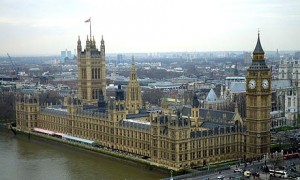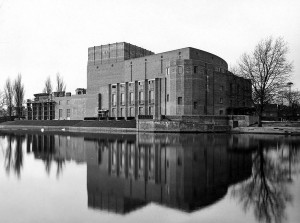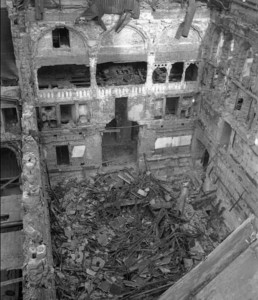On 18 June 2015 a report was published concerning the need for major restoration on the Houses of Parliament in London. It outlines a number of possible options for the work and for what might happen to Parliament in the mean time.
This piece suggests possible alternative venues and while most of them involve staying in London the possibility of moving the centre of government to the midlands or north of England has been raised: both the new Library of Birmingham and Manchester’s Town Hall have been suggested, not entirely seriously. This isn’t the first time it has been proposed that Parliament might move out of London, and Shakespeare was involved.
At the outbreak of World War 2 in 1939 it was possible that the capital would be bombed and large parts of London would be destroyed. Contingency plans were accelerated for Parliament to move elsewhere, and the chosen venue was the Shakespeare Memorial Theatre in Stratford-upon-Avon. The SMT was a new building: the auditorium could seat around 1200, and adjoining it was the first theatre, known as the Conference Hall (now the site of the Swan Theatre). Stratford offered both these and a reasonable amount of accommodation for Lords and Members of Parliament in an area that was unlikely to be a target for bombs. Planning proceeded swiftly, and on 12 June 1940 Sir Victor Goodman, the Clerk to Parliament, completed a document on Billeting at HK (the code name for Stratford-upon-Avon). A copy of this is in the Shakespeare Centre Library and Archive, ordered from the House of Commons Library by Marian Pringle while researching her book The Theatres of Stratford-upon-Avon 1875-1992. In this document Goodman refers to several additional reports he has prepared, and it’s clear that this plan was based on detailed investigations. The Theatre would become the House of Commons, the Conference Hall the Lords. The whole building would be commandeered and dressing rooms, the Museum and Library would become into offices. The theatre staff would be kept on: technicians, porters and cleaners would be needed, and staff from the House of Commons kitchens would take over the facilities at the theatre. The Shakespeare Hotel had already been commandeered and was to be used by the Parliament Office and the Lord Chancellor’s Department, and would provide rooms for ministers, shorthand writers and a teleprinter. New telephone lines had been installed and appropriate furniture brought in. Peers were to be billeted at the Falcon Hotel, and three large private houses some five miles away “should be reserved for special individuals”. Other staff were to be billeted in boarding and private houses graded A, B and C depending on their comfort and distance from the Theatre.
In his blog, volunteer at the SCLA Phil Spinks ponders whether these plans were such an open secret that the whole thing might have been an elaborate hoax, but there have been a number of articles written on the subject and no alternative plan has been revealed. A few years later when a German invasion was no longer a threat, the Manchester Guardian (26 April 1945) reported on the plans for moving Parliament in the days of the blitz. “Now it can be told that arrangements were made to transfer the two houses together with the Parliamentary journalists, to Stratford-on-Avon, where the Memorial Theatre was to furnish the necessary accommodation for the two chambers”.
Goodman’s document was written three months before the start of the London blitz , that continued for 57 consecutive days, then intermittently until May 1941. The Guardian piece explains why the plans came to nothing. In September 1940 the “dreadful bombing …never reached the level anticipated and after then the plans were dropped”. Parliament was damaged during a number of raids, and ironically on the last day of the Blitz on 10 May 1941 the Commons Chamber was completely destroyed. The war continued to rage until 1945 and it was just five years afterwards, in October 1950, that the new chamber was officially opened.
In this piece Steve Fox outlines how plans for evacuating the government and civil service had been under consideration since 1936. This site considers the discussions about moving parliament before the war and the bombing raid in May 1941, and here the damage to the Palace of Westminster during the war is explored.
It’s interesting to contrast the work in the late 1930s with current procedures. A report was commissioned into the need for refurbishing Parliament in 2012 and as a result of this the Independent Options Appraisal was carried out by an independent consortium from December 2013. Now a joint select committee will be formed to decide which of the options is to be recommended before the question comes under further discussion in Spring 2016. Rebuilding is unlikely to start before 2020. If Parliament moves completely out of the Palace of Westminster the work will take 6 years, and cost £3.5-£3.9 billion. If they take a halfway-house option, moving out in stages it will take 11 years and cost £4.4 billion. And if they don’t move out, it will take 32 years and cost £5.7 billion.
And what would Stratford have become like if the planned relocation of Parliament had taken place? With the theatre closed for years, and all the accommodation in the town taken over by the government, would tourism in Stratford have ever recovered? In fact during the war the theatre continued to put on performances, entertaining among others many American GIs stationed in the area, and ensuring that Shakespeare’s work was firmly linked to the struggle for the future of Britain.





I rather think that Stratford had a lucky escape – I doubt it would’ve taken the Germans too long to find out and sent the Luftwaffe after a new target…..the damage to local people and heritage could’ve been horrendous.
Besides……..actors have big enough egos – but politicians!